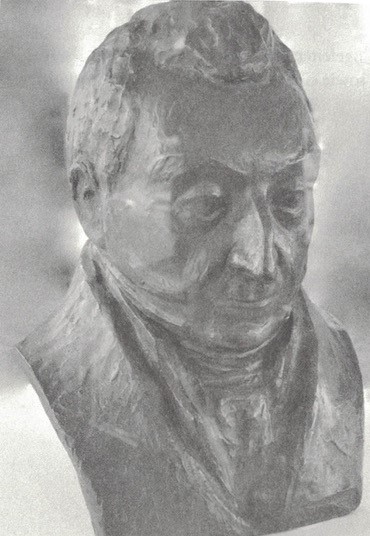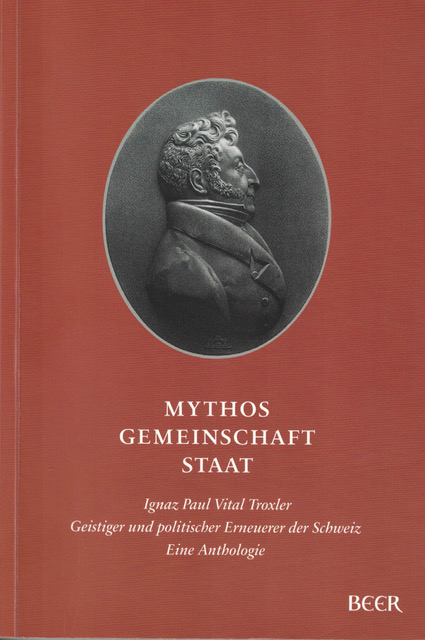«Freedom of the fatherland was my first love»
Ignaz Paul Vital Troxler (1780–1866) as intellectual and political innovator of Switzerland
by Dr phil. René Roca, Research Institute for Direct Democracy
The Ignaz P. V. Troxler Association (www.ipvtroxler.ch) is working intensively on the legacy of this great Swiss thinker. One fruit of this effort was a first volume with selected essays and lectures from the Troxler commemorative year 2016 with the programmatic title “Erbe als Auftrag” (“The legacy as a mission”). Now the second volume is available with the title “Mythos, Gemeinschaft, Staat. Ignaz Paul Vital Troxler, geistiger und politischer Erneuerer der Schweiz.”(Myth, Community, and State. Ignaz Paul Vital Troxler, intellectual and political innovator of Switzerland)* Andreas Dollfus, the responsible editor, presents an anthology with carefully selected Troxler texts, which is a new edition of a publication first published in 2005 and recently sold out. He introduces the collection of texts and repeatedly provides Troxler’s texts and speeches with profound commentaries. This gives the reader a good overview and insight into Troxler’s extremely multifaceted intellectual and political career.
The collection opens with an autobiographical fragment by Troxler, written in 1830. Troxler himself came from a humble background, grew up in Beromünster (Canton Lucerne) and lost his father at an early age. At the age of nine he attended the Latin school in the canon’s monastery in Beromünster, then the grammar schools in Solothurn and Lucerne. His relationship with an uncle in St. Urban’s monastery, Father Gregor, was special. He introduced the young Troxler to literature and philosophy, as well as teaching him a solid Christian foundation: “[…] and so this monastery became the first academy for me.” In Solothurn he came into contact with the French emigrant world, “and this mostly drew my attention to the great event of the French Revolution and its consequences for my fatherland. I began to feel the universal and think for myself, I read German and French newspapers, my love of freedom was awakening […].” The theme of “freedom” was henceforth central to Troxler’s work, and his philosophical, political and educational thoughts revolved again and again around this important basic prerequisite for a dignified human life.
Guarantee of neutrality for free Switzerland
In another text, Troxler deals with the neutrality of Switzerland. He himself travelled to Vienna in 1815 and took part in the congress there as a private citizen in order to influence the negotiations that were to reshape the political conditions in Europe and Switzerland. He stressed the importance of a guarantee of neutrality for Switzerland and that this would confirm Switzerland’s freedom. Troxler continued: “An outwardly independent and internally self-reliant people is neutral in the best sense.”
Other texts included in the collection are concerned with the freedom of the press, which is fundamental to the establishment and maintenance of democracy, and with the question of what “the good of our fatherland” should be based on, i.e. the basic political and ethical requirements of a democratic state, for example the text on “Unity in spirit as the true natural force of a people” (“Einheit im Geiste als wahre Naturkraft eines Volkes”).
The new Federal Constitution of 1848 – based on natural law and history
Troxler did not only philosophise about the ethical foundations in politics and society, but also intervened concretely in political debates. Since the beginning of the Regeneration in 1830, a new form of government was being discussed in Switzerland, and Troxler also took part in this debate. At that time, Switzerland was a confederacy of states and had only a federal treaty as its constitutional basis. This was no longer sufficient to meet the political and, above all, economic requirements of the time (incipient industrialisation). In 1832, Troxler added a draft constitution to his writing “The One and True Confederation”, which envisaged Switzerland as a federal state: “All true confederation is a federal state, and such was the original one and remained so until the time of its dissolution. As a federal state, it was built on the representation of all citizens as the particularity of places.” It is worth noting that Troxler repeatedly paid tribute to the beginnings of the Swiss Confederacy and stressed that we must remember that heritage. For him, this was the only way a new federal constitution could be founded “on natural law and history”.
Crucial for the design of the federal state still valid today was Troxler’s writing “Die Verfassung der Vereinigten Staaten Nordamerikas als Musterbild der schweizerischen Bundesreform” (“The Constitution of the United States of North America as a Model for Swiss Federal Reform”), which also found its way into the anthology. He published this text at an epochal historical moment, namely in 1848, when a commission of the “Swiss confederate Diet” (Tagsatzung) discussed the new Swiss constitution after the “Sonderbund War”. Troxler gave the commission the decisive impetus to introduce a bicameral system (National Council and Council of States). However, Troxler did not want to simply copy the system of the USA, especially since he saw the spiritual source of this model in the Swiss Confederacy: “The seed of this federal republic [...] was sown in our mountains and transferred from Europe across the sea via Pennsylvania to the rest of the world, where it matured into a fruit on the giant tree. So nothing new comes to us from there [...]!” Troxler also saw the model of the federal state as an important work of reconciliation, so that the Swiss people could grow together again after the Sonderbund War as “equal brothers with equal rights”.
A Troxler for Switzerland today
The writings, an unparalleled treasure, show us a Troxler who can be considered in many respects as an intellectual and political innovator of Switzerland. The epilogue of the volume was written by Max U. Rapold, a lawyer and long-time editor-in-chief and publisher of the “Schaffhauser Nachrichten”. It is entitled “Notwendig: ein Troxler für die heutige Schweiz” (“Necessary: A Troxler for Switzerland today”). Rapold thus established a noteworthy reference to the present at the time of the first edition of the text collection in 2005. He states: “It is his [i.e. Troxler’s] spiritual foundation, his courage to go against the grain in disputes, his resistance to bland compromises in the search for viable political solutions and his deep respect for the eternally valid founding impulse of the Swiss Confederation that can inspire the current struggle for the future of our country”. This sentence has lost none of its topicality, and it is to be hoped that it will continue to be realized not only for Switzerland, but for every democratically founded state. •
* Dollfus, Andreas (ed.). Mythos, Gemeinschaft, Staat. Ignaz Paul Vital Troxler, geistiger und politischer Erneuerer der Schweiz, Beer-Verlag Zurich, 170 pages, CHF 28.–

